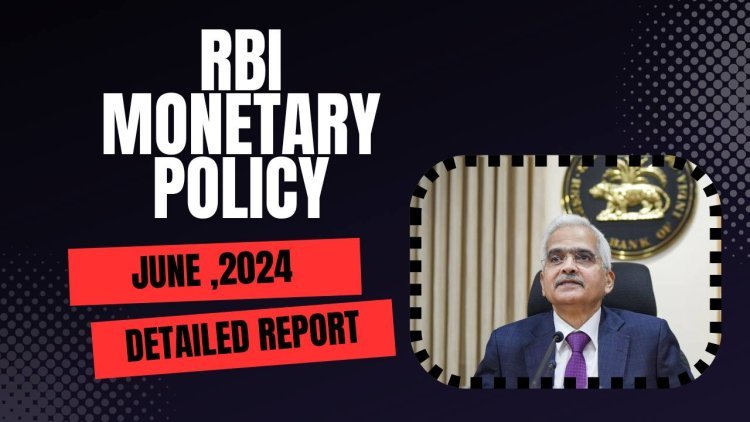RBI's New monetary policy: June 2024
RBI's New Monetary Policy: June 2024 - Repo Rate Unchanged at 6.5%.

Introduction
The Monetary Policy Committee (MPC) determined with a 4:2 majority to keep the repo rate unchanged at 6.5 percent for the 8th time in a row. It met market expectations. The MPC additionally decided to retain its "lodging withdrawal" stance. RBI raised its FY25 GDP boom forecast to 7.2 percent from 7 percent formerly. The critical financial institution saved the 25-year inflation forecast at 4.5 percent. The Chairman of the RBI emphasized that the activities of the significant financial institution are in particular decided using home increase-inflation situations and prospects, and not by the effects of the financial policy of superior economies.
RBI has announced the advent of a digital charge intelligence platform to fight virtual charge fraud using synthetic intelligence and device studying. UPI Lite is now a part of the e-mandate framework that lets clients mechanically pinnacle up their wallets. RBI has additionally proposed to rationalize the Foreign Exchange Management Act (FEMA) concerning the export and import of products and services. RBI's foreign exchange reserves reached a record high of USD 651.5 billion on May 31, 2024.
Overall, the RBI maintained a cautious stance, specializing in preserving macroeconomic stability amid global uncertainty and specifically home fee inflation issues. The principal bank stated a fee cut become unlikely before October 2024.
Factors could influence the RBI to change its monetary stance in the future
The Reserve Bank of India (RBI) is possibly to not forget numerous elements before converting its financial policy inside the destiny. These encompass:
- Economic situations: The RBI intently monitors the boom and inflationary traits inside the Indian economy. A strong monetary boom and strong inflation may also result in an extra accommodative economic policy, while a slowdown or high inflation might also require a greater restrictive stance.
- International elements: Global economic traits, particularly within the US, can have an impact on RBI's selections. For example, if the US Federal Reserve lowers hobby rates, the RBI can comply with in shape to hold competitiveness and assist economic boom.
- Fiscal policy: RBI's financial policy is inspired by the government's economic coverage. A huge growth in public area spending or a massive economic deficit may result in better inflation and pressure the RBI to tighten financial situations.
- Food inflation: Food inflation remains a first-rate issue for the RBI. If meal charges continue to upward push, the RBI might also hold a careful stance to prevent inflation from spiraling out of control.
- Oil costs: Geopolitical tensions and fluctuations in crude oil fees can affect inflation and RBI's economic policy decisions. An upward thrust in oil costs may lead to higher inflation and pressure the RBI to hold a restrictive stance.
Monetary Policy in Advanced Economies: RBI's selections are motivated by the monetary policy of superior economies, in particular America. If the United States relevant bank makes the most important modifications to its financial policy, the RBI can follow in shape to live on target and help growth. - GDP boom forecast: RBI's GDP increase forecast for the 25th monetary year has been raised to 7.2% from the earlier 7%. These strong growth prospects may additionally result in an extra accommodative financial policy.
- Inflation forecast: RBI has maintained its 25-12 months inflation forecast at four.Five%. If inflation stays inside the target variety, the RBI may also keep its modern stance or maybe remember a rate cut in the future.
- Liquidity and Credit: RBI carefully video displays units the liquidity and credit conditions of the economy. If liquidity is excessive and credit is simply available, the RBI can maintain an accommodative capacity to assist monetary growth.
- Digital Payments and Financial Inclusion: RBI is setting up a virtual payments intelligence platform to fight charge fraud and promote monetary inclusion. This may result in further reforms within the economic zone and influence RBI's economic policy selections.
These factors retain to form the RBI's financial policy selections and ensure that the imperative bank continues a sensitive balance among monetary boom and fee balance.
The upcoming monsoon season impact the RBI's monetary policy decisions
The upcoming monsoon season is essential for the financial policy selections of the Reserve Bank of India (RBI). A normal monsoon is anticipated to positively impact the rural zone, that is especially depending on monsoon patterns. This could result in several vital results affecting RBI's policy framework:
- Controlling meal inflation: A normal monsoon would assist preserve strong agricultural manufacturing, thereby controlling meal inflation and supporting rural incomes. This ought to cause extra bendy financial coverage because the RBI could be much less involved in food inflationary pressures.
- Economic increase: A regular monsoon could help rural consumption and agricultural growth, which can contribute to the average economic boom. This could lead to an extra bendy economic policy as the RBI might recognize more on supporting financial growth and preserving inflation under control.
- Inflation forecast: RBI's FY25 inflation forecast remains at 4.5%. A regular monsoon might assist sustain this forecast as solid agricultural manufacturing keeps meals inflation underneath management. This ought to lead to a extra bendy financial policy as the RBI could be much less concerned approximately inflationary pressures.
- Interest costs: The RBI's decision to keep interest prices unchanged displays its commitment to regulate monetary policy to neighborhood conditions whilst maintaining an eye fixed on global developments. A regular monsoon might assist this view because the RBI is not likely to adjust hobby costs because of outside elements.
- Global Economic Conditions: RBI policy is encouraged by global economic tendencies, especially the stability of the US economic system. A regular monsoon might guide the RBI's cautious stance on price adjustments because the crucial bank is not likely to alter prices due to external factors.
Overall, an everyday monsoon season could support the RBI's supportive economic coverage, which makes a specialty of sustainable financial boom and maintaining inflation beneath manipulation.













